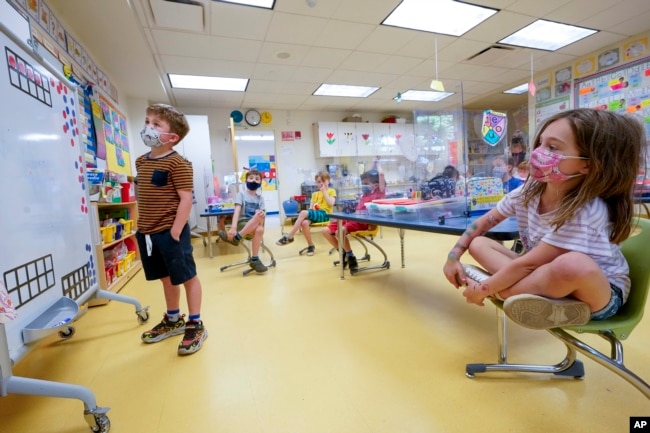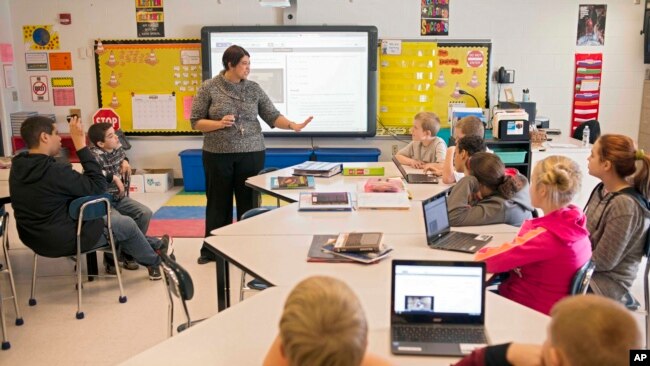リモート授業の限界を見る
まさにその通りです。私も肌で感じている一人です。
高校・大学での対面授業のなかった学生生活においては社会生活もそうですが、学習面に大きな問題が見受けられます。それは個々人の能力の差となって現れます。
楽しんで学んでもらえる授業を!! まさに格闘の日々!!
VOAで英語を学びましょう!!
パンデミック時、なぜ学生は数学で最も苦労したのか?(和訳)
Why Did Students Struggle Most in Math during the Pandemic?
December 06, 2022
アメリカの公立学校の生徒たちは、パンデミック時に数学で苦戦しました。
全米教育進歩調査(NAEP)は、全米の公立学校の4年生と8年生を対象に行われる数学と読解のテストです。今年の結果は、このテストが最初に発表された1990年以来、生徒のスコアが数学で最も減少したという結果でした。
全米のすべての地域で、数学の点数が低下したと報告されています。3分の1以上の生徒が基礎レベル以下の点数を取っています。また、読解力よりも数学の低下がより深刻でした。
パンデミック時に生徒が遠隔学習で苦労していたことを示す証拠はたくさんあります。特に数学で苦労した、とフランシス・アンダーソン氏は言います。彼女はネブラスカ大学オマハ校の教育研究者であり、元教師です。彼女の研究の中心は数学の能力です。
彼女はThe Conversationのインタビューで、数学の能力が低い生徒には、もっと対面での学習が必要だと述べています。
アンダーソン氏は、遠隔学習では”教師は生徒を引きつける方法をあまり持っていなかった。数学が苦手な生徒に適した、実践的な活動やプロジェクトベースの学習を行うことが難しかった"と言っています。
また、数学の指導の多くは視覚的な学習であることも付け加えています。「1つのスクリーンだけでは足りないのです」と彼女は言います。
ヘザー・ヒル 氏とジョン・スター氏は、ハーバード大学教育学部の教授です。ハーバード大学の教育ポッドキャストで、NAEPの結果について話しています。ヒル氏は、”数学のスコアは、生徒の学習機会に対して [リーディングや英語のスコアよりも] 常に敏感である”と述べています。
彼女は、多くの読解力は、学校以外に家庭で培われると述べています。例えば、子供たちは家で本読んだり、インターネットをしたり、友達からのテキストメッセージを読んだりすることができます。しかし、子供たちが教室以外で数学のスキルを鍛える方法は少ないのです。
「学校は、ほとんどの場合、子供たちが数学を学ぶ唯一の場所なのです。」とヒル氏は言っています。
数学の教師でもあるスター氏は、NAEPの得点が8年生(中学2年生)で低いのは、これらの生徒が遠隔学習を始めた年齢が原因だと主張しています。点数が最も低下した8年生(中学2年生)までの2年間は、数学のスキルを身につけるために非常に重要だと彼は言います。arithmetic算数からalgebra代数など、より複雑な数学に移行し始める時期であると彼は言います。8年生(中学2年生)のNAEPでは、主に代数のスキルがテストされます。
「ですから...彼らが本当に苦労しているのは驚きではないのです。その苦労を解消するのは簡単ではありません」とスター氏は述べています。
さらに、オンライン学習では、教師は "数学の指導で最も望ましくない面 "を使って数学を教えることを余儀なくされると付け加えます。教師はより多くの講義をしなければならず、生徒との対話も少なく、数学の指導にはあまり効果的ではない、と彼は言います。
「必ずしも教師が悪いわけではなく、パンデミック中に教えざるを得なかったということです。」とスター氏は話します。
ヒル氏は、数学の授業では、教師のパフォーマンスが低いという証拠がいくつかあると、付け加えています。多くの場合、教師は特に数学を楽しんでいるわけでもなく、自分が数学の専門家だと思っているわけでもない、と彼女は言います。そしてその気持ちが、自信を持って教えることを難しくしているのです。
両氏は、 特に、最も苦労した生徒にとって、学校側がパンデミック時の学習損失を補うことは非常に困難なことだろうと言います。特に数学では、パンデミックから戻ってきた生徒の能力にばらつきがありました。生徒の能力にばらつきがある中で、教師がクラス全体の授業計画を立てるのは大変なことだと、スター氏は言います。
学習面での遅れを取り戻すには、教室外での特別なサポートが必要だというのが彼らの意見です。
ネブラスカ大学のアンダーソン教授は、「遅れをとった生徒には、2倍の指導が必要です」と述べています。
リソースは、最も苦労した生徒やコミュニティ、多くはマイノリティに回すべきだとヒル氏は言います。例えば、少人数のグループで個人指導をすれば、数学で遅れを取り戻すことができると、ヒル氏は指摘しています。
ヒル氏は、困難が待ち受けているとはいえ、「子供たちはかなりresilient回復力があります。子供たちに学ぶopportunities機会を与えれば、いろいろなことを学ぶようになるのです」と言います。
Why Did Students Struggle Most in Math during the Pandemic?
Students at American public schools struggled in math during the pandemic.
The National Assessment of Education Progress (NAEP) is a math and reading test given to fourth and eighth grade students in public schools around the country. Results from this year showed that students’ scores had the largest decreases in math since 1990, when the test was first released.
All areas of the U.S. reported lower test scores in math. More than one-third of students scored below basic levels. The decreases were also more severe in math than in reading.
There has been a lot of evidence showing that students struggled with remote learning during the pandemic. They especially struggled with math, said Frances Anderson. She is an education researcher with the University of Nebraska-Omaha and a former teacher. Her work centers on math ability.
She said in an interview with The Conversation that students, who are not as skilled in math, need more face-to-face learning.
Anderson said that during remote learning, “teachers didn’t have as many ways to keep students engaged. It was difficult to do hands-on activities and project-based learning, which are better for students who struggle in math.”
She added that a lot teaching math is visual learning. “You need so much more than one screen,” she said.
Heather Hill and Jon Star are professors at Harvard University’s school of education. They spoke on Harvard University’s education podcast about the NAEP results. Hill said "math scores have always been more sensitive [than reading and English scores] to students' opportunities to learn.”
She said a lot of reading skills are developed in the home, in addition to school. Kids can read books and the internet at home, or read text messages from friends, for example. But there are fewer ways for kids to work on math skills outside of the classroom.
“School is the only place that kids, for the most part, learn math,” Hill said.
Star, who is also a math teacher, argued that NAEP scores were low for eighth graders because of the age at which these students started learning remotely. He said that the two years leading up to eighth grade, where scores declined the most, are extremely important for building math skills. He said those are the years when students start moving from arithmetic to algebra, and other more complex mathematics. The NAEP for eighth graders largely tests algebra skills.
“So…it's no surprise that they're really struggling. Those struggles are not going to be easy to make go away,” Star said.
He added that in online learning, teachers were forced to teach math using the “least desirable aspects of math instruction that we would want to see.” Teachers had to lecture more and there was less student interaction, which is not as effective for math instruction, he said.
“It's not necessarily the teachers’ fault, it's just the way that they've been forced to teach during the pandemic,” Star said.
Hill added that there is some evidence that teachers do not perform as well when they teach math. Often, teachers do not especially enjoy math, nor think of themselves as math experts, she said. And that feeling can make it hard to teach the subject confidently.
Both said it is going to very difficult for schools to make up for learning losses during the pandemic, especially for the students who struggled the most. Especially with math, students returned from the pandemic with uneven abilities. It can be hard for teachers to form lesson plans for entire classes when the skills are so varied among students, Star said.
They agreed that to make up for the loss in learning, students are going to need a lot of extra help outside the classroom.
“Students who have fallen behind should have twice as much instruction,” said Anderson, from the University of Nebraska.
Resources should go to students and communities which struggled the most, often minorities, Hill suggested. For example, tutoring students in small groups can help kids catch up in math.
Hill said although difficulties lie ahead, “kids are pretty resilient. You give kids opportunities to learn and they learn stuff.”
Words in This Story
remote — adj. connected by a computer and not in a place such as a school or office
engage — v. to get involved or be interested in something
arithmetic — n. the part of mathematics that deals with adding, subtracting, multiplying and dividing numbers
lecture — n. a talk or speech given to a group of people to teach them about a subject
resilient — adj. to become healthy, strong or to recover after something bad happens
opportunity — n. the chance to do something

